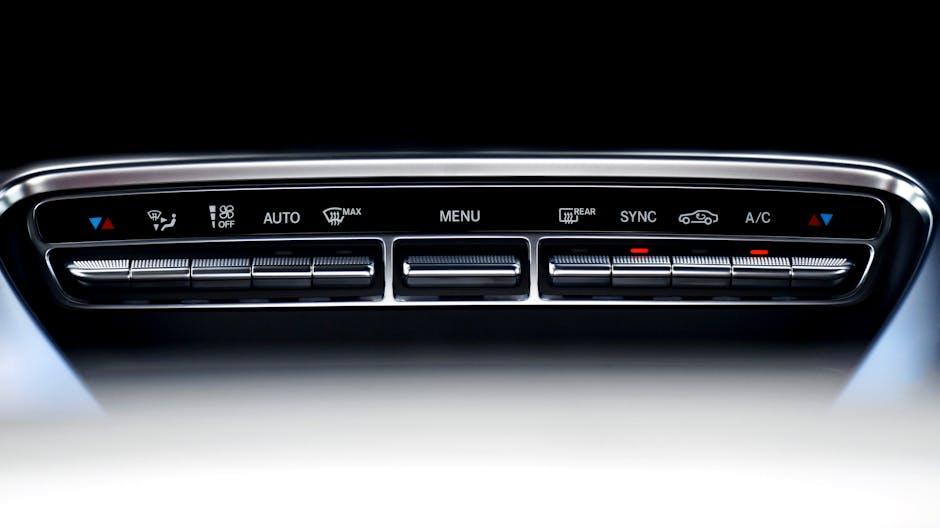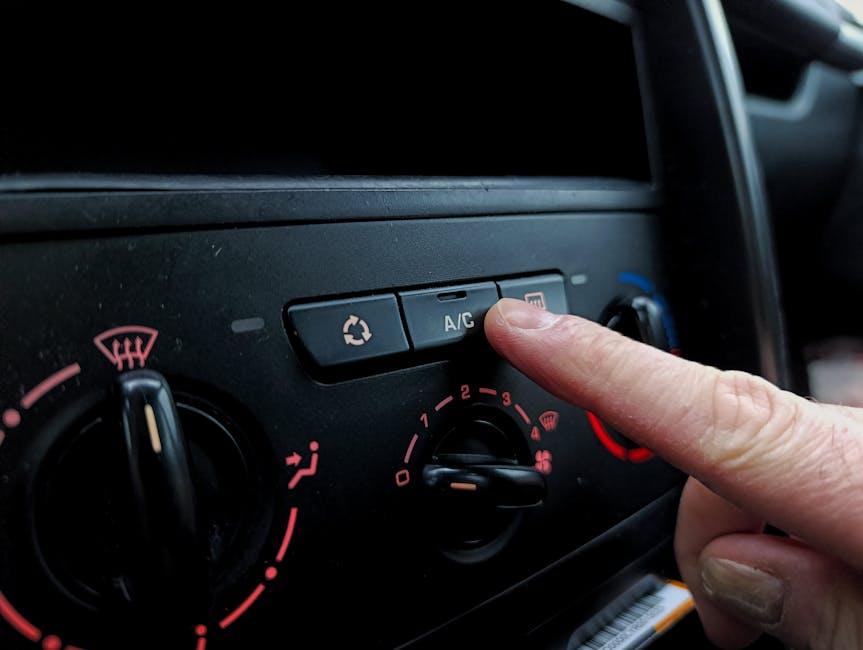As the summer sun blazes and temperatures soar, your car’s air conditioning becomes more than just a luxury—it’s a vital escape from the heat. But what happens when that refreshing cool breeze starts to fade or disappear altogether? Often, the culprit is low refrigerant levels, signaling that your car AC needs a recharge. Recognizing the subtle signs early can save you from discomfort and costly repairs down the road. In this article, we’ll explore the telltale symptoms that indicate it’s time to give your car’s air conditioning system a much-needed boost.
Table of Contents
- Recognizing the Early Warning Signs of a Weak Car AC
- Understanding the Impact of Reduced Cooling Efficiency
- Identifying Strange Noises and Odors from Your AC System
- Checking for Visible Leaks and Refrigerant Loss
- The Importance of Monitoring Cabin Airflow and Temperature
- When to Seek Professional Diagnosis and Recharge Services
- Q&A
- Closing Remarks

Recognizing the Early Warning Signs of a Weak Car AC
Your car’s AC system might start to falter long before it completely stops blowing cold air. Being alert to subtle clues can save you from a sweltering drive or costly repairs down the line. Often, the earliest symptoms are not dramatic but rather persistent and easily overlooked. You may notice:
- Gradual loss of cooling power – The air feels less icy, and you find yourself turning the temperature dial lower than usual.
- Unusual noises – Whirring or hissing sounds when the AC kicks in can signal leaks or compressor issues.
- Inconsistent airflow – Air vents blow intermittently or weaker than before, hinting at refrigerant drops or blockages.
Here’s a quick breakdown of what these early signs might imply about your AC’s health:
| Symptom | Likely Cause | Suggested Action |
|---|---|---|
| Warm air despite AC running | Low refrigerant levels | Schedule a recharge and leak check |
| Hissing sound | Refrigerant leak | Visit a mechanic for diagnosis |
| Weak airflow | Clogged air filter or duct issues | Replace filter and inspect ducts |

Understanding the Impact of Reduced Cooling Efficiency
When your car’s air conditioning system starts to underperform, it’s often a sign that the cooling efficiency is taking a hit. This drop in efficiency means your vehicle’s cabin won’t reach the refreshing temperatures you expect, which can make even short drives uncomfortable during hot days. Often caused by low refrigerant levels or subtle leaks, reduced cooling power forces your AC compressor to work harder, potentially leading to mechanical wear and higher energy consumption. Your engine may also experience increased strain as it compensates, resulting in reduced fuel efficiency and possible overheating issues if left unchecked.
Recognizing the symptoms early can save you both time and money. Here are common indicators to watch for:
- Warm air blowing even after the AC is on full blast
- Longer cooling times compared to usual performance
- Unusual hissing or bubbling sounds coming from the AC system
- Visible frost or ice buildup on the AC lines or compressor
| Cause | Effect on Cooling | Recommended Action |
|---|---|---|
| Low Refrigerant | Reduced cooling capacity | Recharge refrigerant |
| Compressor strain | Irregular airflow, noise | Professional inspection |
| Leaks in system | Cooling efficiency loss | Seal or repair leaks |

Identifying Strange Noises and Odors from Your AC System
When your car’s AC system starts to emit unfamiliar sounds, it’s often a subtle cry for help. These noises can range from hissing or bubbling sounds, which may indicate a refrigerant leak, to loud rattling or clanking that suggests loose components or a failing compressor. Ignoring these auditory cues not only risks further damage but can also lead to an uncomfortable driving experience, especially on hot days. Listening carefully to these sounds and early diagnosis can make all the difference in maintaining a cool and efficient vehicle.
In addition to strange noises, unusual odors are a strong indicator of underlying issues within your AC system. A musty or moldy smell often points to mold growth inside the evaporator or clogged vents, while a sweet, syrupy scent can signal refrigerant leaks that need immediate attention. Here’s a simple guideline to recognize odor-related warnings:
- Musty or damp smell: Mold or mildew buildup.
- Sweet, fruity scent: Possible refrigerant leak.
- Burning or acrid odor: Electrical issues or worn belts.
| Noise Type | Possible Cause | Severity |
|---|---|---|
| Hissing/Bubbling | Refrigerant leak | Moderate |
| Clanking/Rattling | Loose compressor parts | High |
| Whining | Compressor strain | High |

Checking for Visible Leaks and Refrigerant Loss
When your car’s air conditioning starts to lose its chill, one of the first things to investigate is any obvious signs of leaks. Visible leaks usually appear as oily residue or wet spots around AC components such as hoses, condenser, and compressor. These oily patches are a classic indicator that refrigerant is slowly escaping, often unnoticed by the driver until the system’s performance takes a nosedive. A thorough visual inspection under the hood, especially around connection points and seals, can reveal telltale signs of fluid seepage that signal the need for immediate attention.
In addition to spotting leaks, keep an eye out for subtle clues indicating refrigerant loss over time, like unexpected drops in cooling efficiency or the AC blowing warm air intermittently. A simple checklist can help you stay ahead of major issues:
- Check for oily stains on AC lines and fittings
- Look for unusual wetness around the compressor
- Monitor AC performance fluctuations during operation
| Leak Indicator | Possible Cause | Recommended Action |
|---|---|---|
| Oily residue near hose connections | Loose or damaged hose clamps | Tighten or replace clamps |
| Wet spots on compressor body | Compressor seal failure | Professional seal repair |
| Cracks in condenser fins | Physical damage from debris | Replace damaged section |

The Importance of Monitoring Cabin Airflow and Temperature
Consistent airflow and temperature control within your vehicle’s cabin are essential for a comfortable driving experience. When the air conditioning system or its refrigerant level is compromised, you might notice uneven cooling or weak airflow, especially during hot weather. These subtle changes are your car’s way of signaling that something isn’t quite right. By paying close attention to these sensory cues, you can catch issues early before they escalate into costly repairs.
Signs to watch for include:
- Reduced air pressure coming from vents
- Warm or inconsistent air temperature
- Increased cabin humidity or fogging on windows
- Unusual noises when the AC is running
| Symptom | Possible Cause | Immediate Action |
|---|---|---|
| Weak airflow | Leaking refrigerant or clogged filters | Inspect AC system seals and replace filters |
| Warm air | Low refrigerant level | Recharge AC with refrigerant |
| Fogging windows | Humidity imbalance | Check system humidity control and airflow |

When to Seek Professional Diagnosis and Recharge Services
When you notice persistent issues like weak airflow or fluctuating cabin temperatures, it’s a wise decision to consult a professional technician. These signs often indicate underlying problems beyond a simple refrigerant top-up, such as leaks or compressor malfunctions. Attempting a DIY recharge without proper tools and knowledge might lead to short-term relief but won’t address the root cause, potentially causing further damage.
Pay particular attention to these triggers:
- Consistent hissing or unusual noises from the AC system
- Visible oil stains around AC components, hinting at refrigerant leaks
- Bad odors circulating through the vents
- Failure of the AC to cool even after a recharge
If you experience any of these symptoms, professional diagnosis is crucial. Here’s a simple guide to help you decide when to act:
| Symptom | Action Required |
|---|---|
| Weak Airflow | Check for blockage and recharge if needed |
| Noise from Compressor | Immediate professional inspection |
| Foul Smell | Clean system and check for mold or leaks |
| No Cooling | Diagnose for leaks, recharge, or parts replacement |
Q&A
Q: How can I tell if my car’s AC needs a recharge without specialized tools?
A: One of the easiest ways to spot a recharge need is if your AC blows warm or less cold air than usual. You might also notice that it takes longer to cool the interior on hot days. These signs often mean the refrigerant levels are low, signaling a recharge is due.
Q: Are strange noises from the AC system a sign that it needs recharging?
A: Yes, unusual sounds like hissing or bubbling can indicate leaks in the system, leading to refrigerant loss. While strange noises don’t always mean a recharge is needed, they often accompany low refrigerant levels that require attention.
Q: What does ice buildup on AC components tell me about my car’s cooling system?
A: Ice or frost forming on the AC evaporator or lines often suggests that the refrigerant is low or the system is malfunctioning. When refrigerant is insufficient, pressure imbalances cause temperatures to drop and moisture to freeze, signaling the need for a recharge or service.
Q: Can an unusual smell from the vents mean my AC needs a recharge?
A: While smells usually point to mold or debris, a failing AC system with low refrigerant can sometimes affect humidity control, causing musty odors. It’s a clue worth investigating along with refrigerant levels.
Q: How does AC performance change as refrigerant leaks out over time?
A: Refrigerant leaks slowly reduce the system’s cooling efficiency, meaning your car will gradually produce less cold air. You might notice your car’s AC still works but barely cools, which is a clear sign a recharge is imminent.
Q: Is a frequent need to recharge a sign of a bigger problem?
A: Definitely. If you find yourself recharging often, there’s likely a leak or mechanical fault. It’s important to have a mechanic inspect your system to prevent recurring refrigerant loss and avoid costly repairs down the line.
Q: What should I do if I suspect my car AC needs a recharge?
A: The best approach is to have a professional check the refrigerant level and inspect the system for leaks. Recharging the AC without fixing leaks is just a temporary fix, so proper diagnosis ensures your car stays cool longer.
Closing Remarks
Knowing when your car’s AC needs a recharge can save you from sweaty commutes and unexpected breakdowns. By paying attention to these subtle signs—like weak airflow, strange smells, or inconsistent cooling—you can take timely action to keep your cabin comfortable all year round. Remember, a well-maintained AC system doesn’t just cool your ride; it preserves your peace of mind on every journey. So, keep an eye out for these warning signals and give your car the care it deserves before the heat becomes unbearable.

